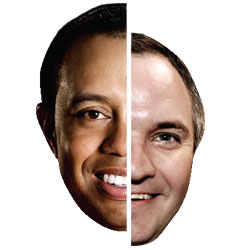
Wwhat do Tiger Woods and Tareq and Michaele Salahi have in common? On the surface, not much: An impossibly gifted professional golfer’s minor car crash leads to explosive revelations about alleged infidelity, and a pair of fame-hungry regional social climbers hoping for reality-TV stardom crash the White House, simultaneously amusing and frightening everybody in the process. But these facts alone didn’t propel them from TMZ to the Times to your own cousin’s hysterical Twitter page. The reason America can’t stop talking about these stories is that they are both centered on one confounding truth about modern communication: the “yadda yadda yadda” factor. Made immortal in a popular Seinfeld episode, in which a peripheral character leaves out crucial information in stories by saying “and yadda yadda yadda,” the maneuver only succeeds in making the listener more curious about the part of the anecdote that was left out.
For nearly a week after the state dinner on November 24, the world didn’t really hear from the Salahis, save for a statement from their (fantastically named) publicist, Mahogany Jones. “The Salahis were honored to be a part of such a prestigious event,” she said. “They both had a wonderful time.” What on Earth did that mean? How could you begin to parse that? Even when the Salahis went on the Today show December 1, they avoided the meat of the story: Did you honestly think you were invited, and why? Instead what we got, roughly, was this: “We were e-mailing back and forth, I put on a sari, and yadda yadda yadda, I was touching the president.”
Had they just said (as e-mail records later revealed) “Hey, because we sent some e-mails, we thought maybe they’d let us in for part of it, so we just showed up and bluffed our way in. It was all in fun!” then they wouldn’t be nearly so riveting. Their somewhat seedy social and financial setbacks might not have been so thoroughly delved into, either.The same goes for Tiger Woods, who started out with basically this story: “It was late at night after Thanksgiving, and I was at home with my family, and yadda yadda yadda, I crashed my SUV into my neighbor’s tree, and its rear windows were smashed out by my wife.”
Woods is so private that his yacht is named Privacy. But his devotion to the principle ran aground after his refusal to give a simple account of what happened (even to the police!). Every murky statement he’s released since then (He is “human” and “not perfect”? He regrets “those transgressions”?!) has served to further pique public interest. Meanwhile, it’s a free-for-all of booby blondes waiting to sell their salacious stories of how they slept with him, or their friend did, or they didn’t sleep with him but they curiously have a lot to say about it anyway.
You’d think at least he would be better at this. “As a rule, the quicker you get in front of the truth the better,” explains Dan Klores Communications president Sean Cassidy. “When you leave holes in the story, it leaves room for interpretation, and interpretation is not something you can control, and it creates the impression that you’re being less than truthful.” Or, as MSNBC’s entertainment columnist Courtney Hazlett puts it, when that story came out with such visible holes, she knew “something was up.”
Just think how much longer David Letterman’s ordeal would have gone on had he said, “I had a disgruntled CBS colleague who used to date an employee of mine, and yadda yadda yadda, I got blackmailed for $2 million.” Instead, he told—frankly maybe too much. But the press, and the public, eventually just moved on, imagination sated.
Have good intel? Send tips to [email protected].